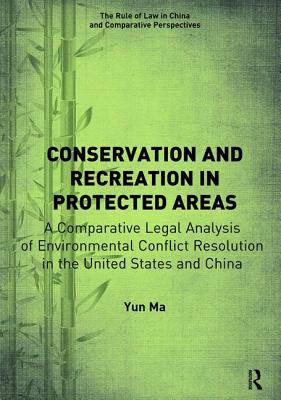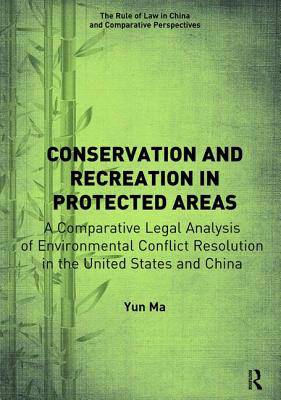
- Afhalen na 1 uur in een winkel met voorraad
- Gratis thuislevering in België vanaf € 30
- Ruim aanbod met 7 miljoen producten
- Afhalen na 1 uur in een winkel met voorraad
- Gratis thuislevering in België vanaf € 30
- Ruim aanbod met 7 miljoen producten
Zoeken
Conservation and Recreation in Protected Areas
A Comparative Legal Analysis of Environmental Conflict Resolution in the United States and China
Yun Ma
€ 62,45
+ 124 punten
Uitvoering
Omschrijving
This book provides a comprehensive and up to date comparative study of the management and resolution of conflicts between conservation and recreation in protected areas in the US and China. Competing claims on the use of nature, increasing regulation of land use and recreational activities, and the conflicting goals between conservation and development have led to a rise in conflicts in the designation and management of protected areas. How to effectively manage and resolve these conflicts has become a challenge for both legislators and managers. By adopting an institutional dimension in legal interpretation, this book critically examines how such conflicts are dealt with in the legal regimes of the US and China while exploring interactions between legislatures, agencies and courts. The book searches for a plausible solution to improve the legal framework of protected areas in China by emulating pertinent mechanisms developed in the US, whilst also presenting legal and policy recommendations to the US. This informative book will be useful for legal scholars in Chinese law, nature conservation law, administrative law and comparative law.
Specificaties
Betrokkenen
- Auteur(s):
- Uitgeverij:
Inhoud
- Aantal bladzijden:
- 308
- Taal:
- Engels
- Reeks:
Eigenschappen
- Productcode (EAN):
- 9781138605619
- Verschijningsdatum:
- 11/05/2018
- Uitvoering:
- Paperback
- Formaat:
- Trade paperback (VS)
- Afmetingen:
- 175 mm x 246 mm
- Gewicht:
- 599 g

Alleen bij Standaard Boekhandel
+ 124 punten op je klantenkaart van Standaard Boekhandel
Beoordelingen
We publiceren alleen reviews die voldoen aan de voorwaarden voor reviews. Bekijk onze voorwaarden voor reviews.











